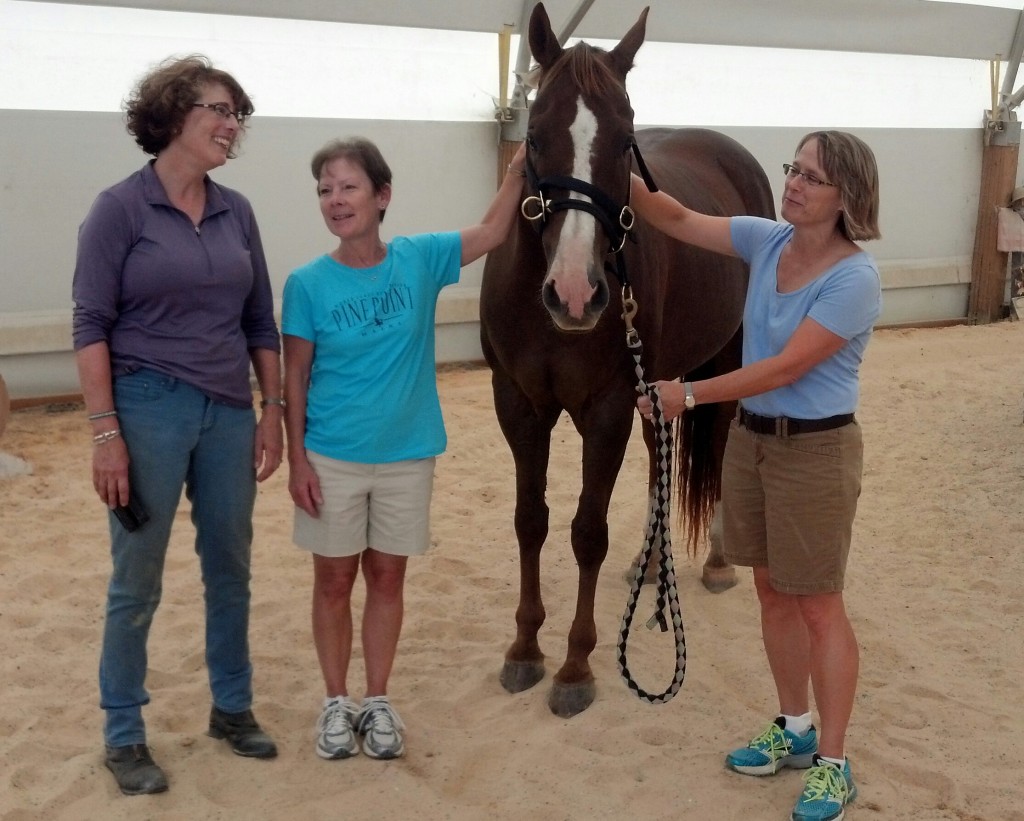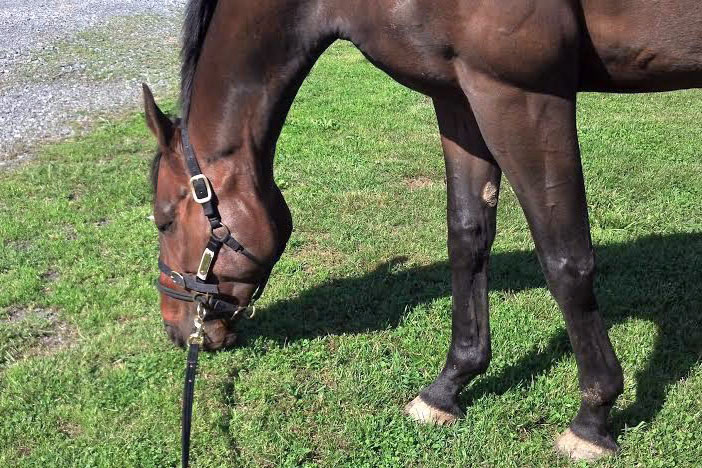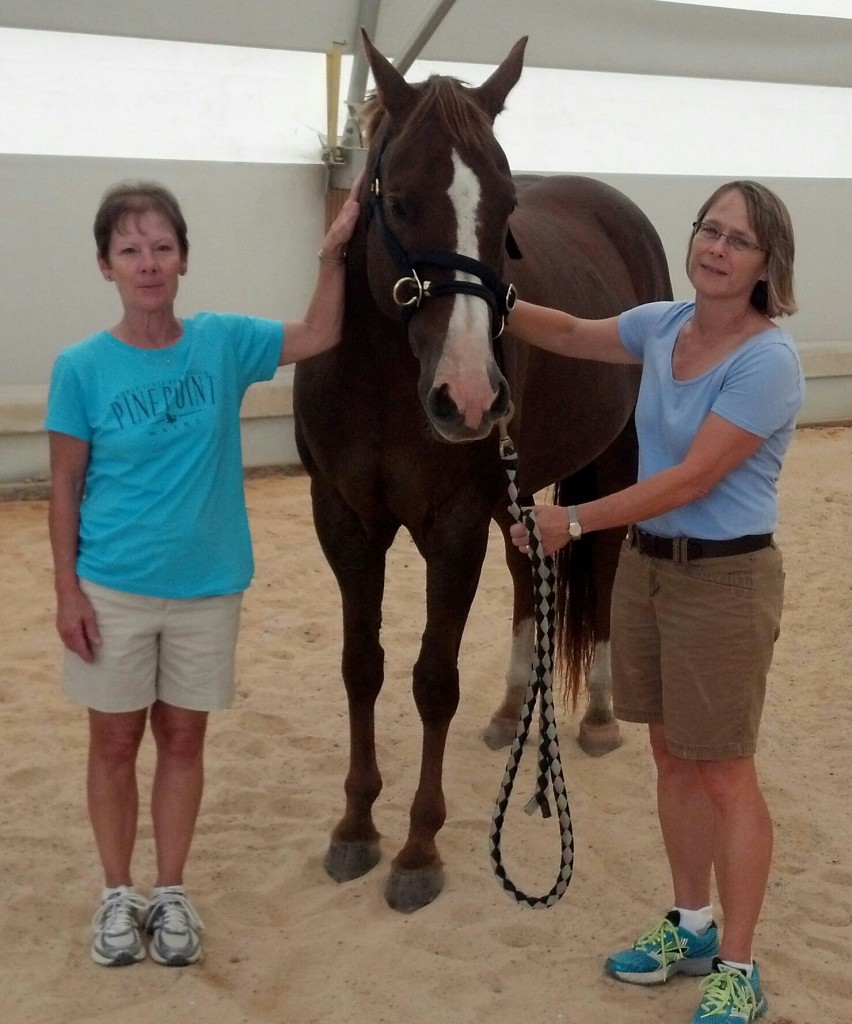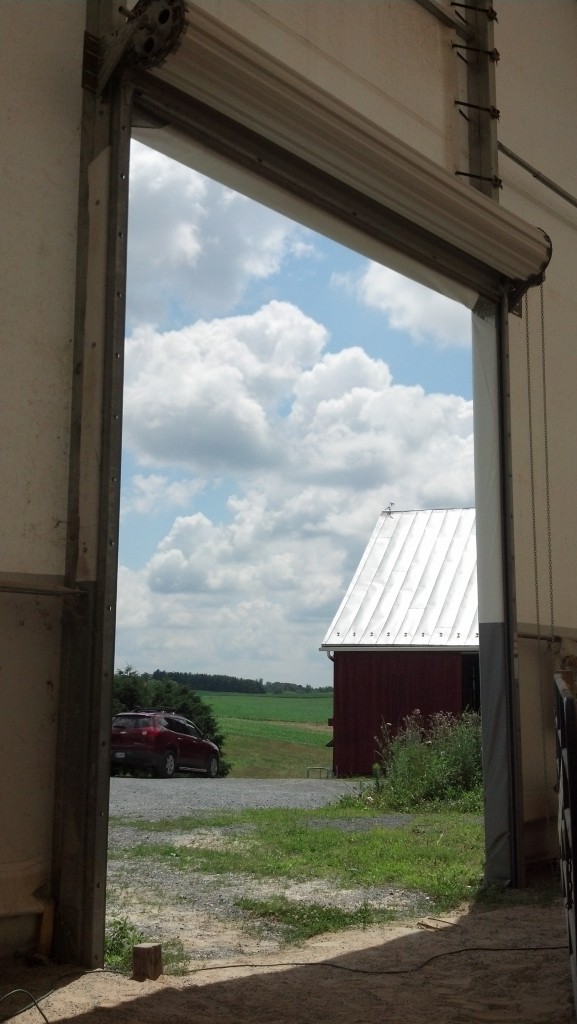
EBH, Joann, Yankee, and Ann at Four Quarters Farm, Hampstead MD—9.4.14
Two leaders from the University of Delaware—Ann and Joann—are facing transitions in their careers and scheduled a paired, half-day of Equus Coaching™ as professional development. Ann’s on sabbatical and considering how she will balance the disparate demands of her changing role as deputy dean in Arts and Sciences and Joann, a senior associate dean for the arts, is concerned about maintaining connection and purpose as she contemplates retirement. Both women were ready for a “deep dive” with the herd at lovely Four Quarters Farm.
What did you expect when you signed up for Equus Coaching?
Joann: I expected to be amazed and surprised, but I never imagined how much so. As [a professor of theater and dance] whose work is centered on the expressive capacity of the human body beyond our habitual use, I was not disappointed!
Ann: Honestly, I had no idea what to expect. It had been so long since I’d been around horses.
What did you like best about the experience?
Joann: The immediate difference this work makes is phenomenal. I had both “success” and “failure” in leading the horse, equally transforming and instructive.
Ann: The whole day was about just being there. I hear myself complaining a lot these days about being pulled in too many directions in an “odd jobs” job. What I realized working with [Thoroughbred gelding] Theo was that, to be effective, I first needed to be fully present and clear with myself about what I wanted him to do. I loved the intense focus of my time with Theo and continue to be amazed by how much I can communicate without words.
[Remembering the moment when she and Theo were stuck at the round pen gate as he turned right, then left, then right, in circles, and she had difficulty moving him forward around the pen, Ann adds]:
I have thought a lot since then about how I am “Theo at the gate,” distracting myself with over-commitment. Wanting to be in the round pen and the pasture at the same time. Wasting energy pivoting back and forth rather than settling into one directional, sustained movement. In my case, the round pen and the pasture are college administration and my own academic discipline.
My interactions with both horses that day and your questions during each session inspired me to listen better to myself and look closely at what I want, not just what others need me to do.

Theo relaxes after Ann’s session
How will your discoveries help you when you leave the farm? How will you take the learning into your life?
Joann: I still feel so deeply connected to [the chestnut mare] Scarlett. Her lesson to me on being connected transcends space and time. I have had very specific applications since our session, noticed by others, not just by me. I’m working daily to ground in my body my intention for any action. For someone who IS a body specialist, it was an awakening to see how I’d lost this awareness.
I am off to lead a personal development workshop in London and am excited to see how the Equus work will inform my presence with participants.
Ann: I can’t say it was my favorite part, but the session with Yankee showed me how I struggled with setting a clear intention. The video showed me that I couldn’t even see when he was crowding me. (There is huge learning value in those videos!) I’ll be using my sabbatical to stage a conversation about how I design my job. And now I know I need the space in my job for the kind of high-energy focused work that so exhilarated me with Theo.
How might we improve future sessions?
Joann: The 10-2 session was perfect for us. I would like to try more of sending the horse (with the long-line) because I did not do well with that. [Here the coach smiles, “So you didn’t do well with that. Is that true? What did you learn about yourself?”]
I had a better experience walking with intention and setting boundaries, but I would enjoy being coached on the exercise where the horse is loose.
Ann: I can’t imagine how to improve future sessions, though I’d love to know more about why you chose the horses you did to work with us. I’m also curious to know what the herding exercise we didn’t do that day might have revealed. I wouldn’t change the flow; it made utter sense.
[EBH editor’s note: Many clients wonder why I choose certain horses for them. Basically, I don’t. Every horse has something to teach us about ourselves. I have an approved list of horses to use for the day, and we bring them in rotation. Often a client will feel drawn to a specific horse’s energy and will step up when that horse arrives. In some workshops, we walk into the paddock and let the client choose the horse to which s/he is attracted for known or unknown reasons. Each situation has its own intelligence; it’s my job to flow with that while keeping everyone safe.]
What would you say to a professional who is contemplating Equus Coaching™? How can it help them in work and life?
Joann: One session lands powerfully and makes an immediate difference. Equus Coaching™ will have you realize, experientially, exactly what you are intending and communicating at any moment. You will walk away with a concrete physical experience of your own power, with an awareness of how you can apply that feeling anywhere.
Beth creates a safe space and meets you where you are. The day is about you and has no agenda beyond that. Her sensitivity to what is needed in the moment is quite special. The horses generously give you exactly what you need.
Ann: This is an amazing opportunity to learn about yourself as well as your mode of interacting with others. “Emotional intelligence” is a buzz-word in business, but there is a huge difference between talking about it and being confronted with it both physically and psychically as you’re challenged to work with a Thoroughbred horse!
By Beth Herman, Certified Equus Coach™ and Principal, EBH Consulting LLC
Developed with sincere gratitude to:
Ann L. Ardis
Deputy Dean and Director, Center for Interdisciplinary Humanities Research
College of Arts and Sciences
University of Delaware
Joann Browning
Senior Associate Dean for the Arts
Professor of Theatre
University of Delaware

Joann, Yankee, and Ann

Equus Coaching™ gives you a unique window on your truth and your world.
View from the indoor arena at Four Quarters Farm.